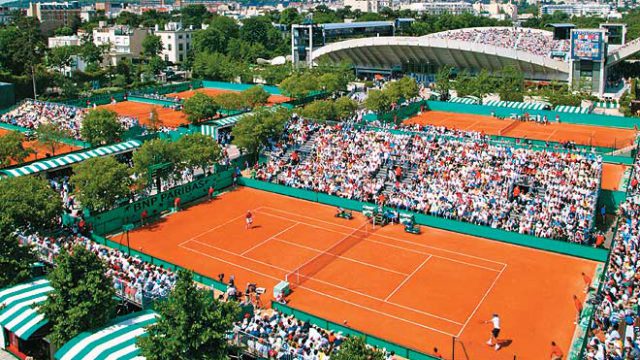My second Paris pilgrimage was cinematic only in the sense that it stemmed from another type of motion-picture viewing — watching sport, on television. For close to a decade now, I have been a huge fan of the Spanish tennis champion Rafael Nadal, popularly known as the “The King of Clay”, and the man who has won the French Open at the Roland Garros Stadium an astonishing nine times in the past ten years. Having resigned myself to never getting to see Rafa play in person (at his favourite setting anyway), I went to the official tournament website and registered for an hour-long guided tour of the venue I have seen so often on TV.
If I were to list the things I didn’t get to see, this tour might be reckoned a disappointment. It being March — two months before the start of this year’s tournament—there was extensive renovation work going on, which meant the players’ locker rooms were not open to public viewing. Besides, the grand Philippe-Chatrier Court — where the men’s semi-finals and final are played each year — had almost no red clay on it; instead there were craters in the ground and plenty of regular mud of the sort that I can more easily find in the dusty park outside my house.
This barely dampened my spirit though: like the tireless Rafa — a master at wearing opponents down in the toughest of match situations, and a less than fluent English speaker — I decided to “focus on the positives, no”? Even if Chatrier lacked personality without its distinctive brick-red clay, the stadium itself had multiple associations for me, and I could imagine I heard the cheers of thousands of viewers as Rafa collapsed to his knees after the last point of the fortnight. I visited the press room, where the champions give their post-match interviews, sat in the chair where Rafa has answered dozens of inane questions over the years, and chuckled at one of the other visitors imitating a famous comical moment from an old press conference — an inopportune leg cramp that led Nadal to slide slowly under the table while he was speaking to a journalist. I took photos of a wall with the players’ signatures on it, and even got my befuddled wife Abhilasha to pose next to the door of the room where players are administered surprise drug tests.
Much like the view of props at the cinema museum, Roland Garros was a little surprising in how small and compact it was; everything seemed like a miniature version of what one sees on television, and I was especially taken aback by the tininess of the second “showpiece” court, named after the legendary Suzanne Lenglen. But this added to the charm. Tucked away in what seems like a back-lane in western Paris, on the boundary of the Bois de Boulogne public park, this is the smallest of four Grand Slam venues; and it feels like a singular, old-world place, given that clay courts have been increasingly marginalised as “specialist surfaces” in recent years.
I ended my tour by posing next to a statue of the legendary Miss Lenglen, outside the court named in her honour. Swinging her racquet ominously in an arc, she reminded me of the shadowy Mrs. Bates with her large knife in the shower scene in Psycho. The City of Lights had brought together two of my inner worlds in a most unexpected way.
Guided tours — in English and French — are conducted multiple times each week (to book tours send an email to musee-visites@fft.fr; one-hour tour: £10.5, stadium plus museum tour: €15).




